Data sharing governance in sub-Saharan Africa during public health emergencies: Gaps and guidance
DOI:
https://doi.org/10.17159/sajs.2022/13892Keywords:
data transfer regulations, data sharing, public health, sub-Saharan AfricaAbstract
While the COVID-19 pandemic has captured the attention of the global community since the end of 2019, deadly health pandemics are not new to Africa. Tuberculosis (TB), malaria and human immunodeficiency virus (HIV) count amongst other serious diseases that have had a catastrophic impact on the African continent. Effective responses to such pandemics require high-quality, comprehensive data sets that can inform policymaking and enhance healthcare decision-making. While data is driving the information economy in the 21st century, the scarcity in Africa of carefully curated, large epidemiologic data sources and analytical capacity to rapidly identify and understand emerging infectious diseases poses a major challenge to mounting a time-sensitive response to unfolding pandemics. Data access, sharing and transfer between countries are crucial to effectively managing current and future health pandemics. Data access and sharing, however, raises questions about personal privacy, the adequacy of governance mechanisms to regulate cross-border data flows, and ethical issues relating to the collection and use of personal data in the interests of public health. Sub-Saharan Africa’s most research-intensive countries are characterised by diverse data management and privacy governance frameworks. Such regional variance can impede time-sensitive data sharing and highlights the need for urgent governance reforms to facilitate effective decision-making in response to rapidly evolving public health threats.
Significance:
We explore governance considerations that ought to apply to the collection, transfer, and use of data in public health emergencies. Specifically, we provide an overview of the prevailing data sharing governance landscape in selected African countries. In doing so, we identify limitations and gaps that impede effective data collation, sharing and analysis. This work could find utility amongst a range of stakeholders, including bioinformaticians, epidemiologists, artificial intelligence coders, and government decision-makers. While this work focuses primarily on an African context, the issues explored are of universal concern and therefore of relevance to a broader international audience.
Published
Versions
- 2023-02-22 (2)
- 2022-10-26 (1)
Issue
Section
License

All articles are published under a Creative Commons Attribution 4.0 International Licence
Copyright is retained by the authors. Readers are welcome to reproduce, share and adapt the content without permission provided the source is attributed.
Disclaimer: The publisher and editors accept no responsibility for statements made by the authors
How to Cite
- Abstract 2086
- PDF 695
- EPUB 77
- XML 142
Funding data
-
National Institutes of Health
Grant numbers 1U01MH127704-01












.png)